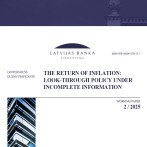Prices in Latvia driven up by higher taxes as well as global energy and food prices
For some months now higher prices have been observed in shops despite rather high unemployment. Until recently it was explained by fluctuations in world energy and food prices but a new factor has appeared as of the beginning of this year: a rise in the value added tax. The rise in the VAT rate accounted for the greatest part of the January price rises, with the consumer price index growing to 1.3% within a month. The annual rise in inflation has thus reached 3.7%.
Such price dynamics conforms to the Bank of Latvia inflation predictions: we expect a rise in annual inflation in the first months of the year and subsequently – a gradual drop in inflation. The average annual inflation in January was still negative at -0.5% and we predict on average a 2.7% for this year. (Such an inflation rate was observed in the period before the years of overheated economy when it developed in a balanced way and growth did not exceed a rate sustainable in the long term.)
At the moment, it is obvious that tax policies as well as the rise in global prices has driven the inflation up at a faster rate than initially expected. Any further world price developments are difficult to predict: they depend not only on weather conditions but also on developments in the global financial markets and the political stability in various countries that keeps deteriorating as people all over the world suffer from the growing food prices. The price expectations included in the financial market future transactions, however, point to expected stabilizing in both food and energy resource prices.
As to the January data, the changes in the tax rate have had their greatest effect on the prices of electrical power: they rose 11%. Against the backdrop of overall rises, the tariffs for natural gas and heating seem less noticeable: despite tax hikes, they fell slightly, having a small diminishing effect on household heating bills. In addition to the tax pressures on inflation, the prices of fuel and, especially, food continued to rise being driven up by global prices. This increases the poverty risk for low income households.
Taking into account the methodology for calculating the CPI and last year's surveys of household budgets, the item weights of consumer basket used in the inflation calculations have been revised. The trend that began already in 2009 continued: as people's income shrank, an ever greater portion of income was spent on food items and energy resources whose prices have grown over the past year. Thus the influence of world food and energy resource price rises on Latvia's inflation increased
Euro introduction has had no effect on inflation in Estonia
In the meantime, Estonia, which just changed over to the euro, has also published its consumer price index. For some time now Estonia has been surprising the rest of the world with inflation indicators that exceed expectations; the annual inflation in January was 5.3%, but the price level did not change month-on-month. We can thus conclude that the changeover from the krona to the euro has not created an upward pressure on prices in addition to the price hikes caused by the global price rises. The Estonian Statistical Bureau has announced that the rounding effect related to the euro introduction is within the range of -0.2 and +0.2 percentage points.
Textual error
«… …»






